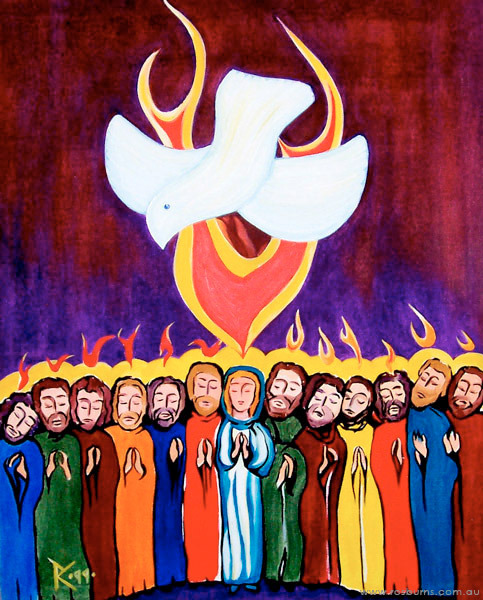Pentecost: The Gifts of the Holy Spirit

Saint Paul offers a list of the fruit of the Holy Spirit. We find that list in his Letter to the Galatians, one of today’s scripture options: love, joy, peace, patience, kindness, generosity, faithfulness, gentleness, and self-control.
If we lived that list with as much commitment as possible, we would qualify as the “saint next door” that Pope Francis speaks of in Gaudete et exsultate (Rejoice and Be Glad), his latest apostolic exhortation. The document is a call to greater holiness for all of us.
Francis is not speaking of holiness as a quality that requires super-piety or seclusion from the cares of the world, but rather, striving to live our lives in an imperfect world with as much genuine goodness as possible.
At the time of our Confirmation, we hear reference to the seven gifts of the Holy Spirit. This is a traditional list that comes from the early church. The seven are good to reflect on from time to time.
Wisdom Wisdom involves a process of coming to see the deeper meaning and hidden lessons of everyday events. The Latin word sapientia comes from the word sapere, meaning to savour or taste. Wisdom helps us to taste and see how good the Lord is and to have a taste for the things of God. It is to have a sense of the divine in all things.
It’s not that different than St. Ignatius suggesting that we are to find God in all things. We see God at work in our lives and in the world. The wonders of nature, historical events, and the valleys and mountains of our lives take on deeper meaning.
Understanding Understanding takes us beyond faith, to a personal appropriation of our beliefs. In the story of the road to Emmaus, we see an illustration of what happens with understanding. As the disciples walked along the road with the Risen Lord and described their experience of dejection, he explained the scriptures to them. As they broke bread with Jesus, “their eyes were opened, and they recognized Jesus” (Luke 24:31).
Understanding is the aha! experience when our faith suddenly makes sense. It’s as if the apostles were saying, “Oh, now I get it. I understand.”
Knowledge The Spirit gives us knowledge of God. This is not about the mere accumulation of facts. A person can read theology books and every word of sacred scripture, but if that person is without a heartfelt understanding, they don’t really have knowledge of God. That person has head knowledge, but not heart knowledge.
The smartest person in the world is not necessarily able to grasp divine truths and have a real appreciation for the surpassing greatness of God. The prophet Ezekiel offers a helpful image. “I opened my mouth; God gave me the scroll to eat and said, feed and be satisfied by the scroll I am giving you. I ate it and it tasted sweet as honey.” That is knowledge!
Courage (or Fortitude) How many of us know of ordinary people who overcome their reluctance and do courageous things? Think of the young man who has the courage to go against the pressure he is getting from peers to join in their vandalism. There’s also the young woman who has the courage to go through with a pregnancy, even after her doctor tells her that there is a high risk of a genetic disorder in the fetus.
Or, there’s the older man who has the courage to make a painful decision about sending his frail wife to a nursing home. They all conquer their fears; they have the gift of fortitude. Cyril of Alexandria says, “With the Holy Spirit within us, it is quite natural for people who had been cowards to become people of great courage.”
Piety In a short teaching before the Angelus some years ago, Saint John Paul II explained that with the gift of piety “the Spirit heals our hearts of every form of hardness, and opens them to tenderness towards God and our brothers and sisters.”
The hardness of hearts cannot exist when we are reminding ourselves of God’s presence. The gift of piety removes from our hearts any tensions, division, bitterness, anger and impatience. These are replaced by feelings of understanding, tolerance and pardon.
Fear of the Lord Fear of the Lord is the feeling of amazement before God. We are aware of the glory and majesty of God. Words such as wonder and awe give a more complete idea of this gift. Think of standing in the presence of someone we greatly admire and respect.
The first time I met Mother Teresa I was actually trembling with nervousness. I had admired her for so long and I knew I was standing in the presence of a living saint. I couldn’t help but contrast this holy woman with my own smallness. It is natural for us to feel that way upon first meeting our heroes. How much more should I tremble in nervousness when I find myself in the presence of God’s goodness.
Counsel Counsel is often referred to as right judgment. This gift enables us to know the difference between right and wrong in a particular circumstance. There may be times when the “right” thing to do is not seen as reasonable by a lot of others. Our actions are in harmony with God’s way of acting in the world.
Think of the example of someone like St. Maximilian Kolbe. His example of self-sacrifice for another prisoner is clearly the “right” thing to do, but it doesn’t appear as reasonable to people who lack faith. This is a strong example of the difference between God’s ways and human ways. It is not always clear that some things are right or wrong. That is why discernment is often necessary.




No Comments